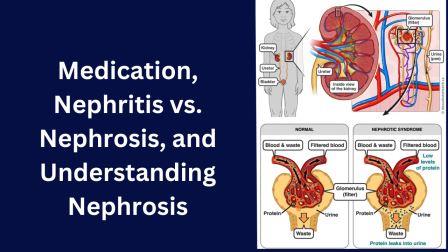Our kidneys are silent powerhouses, filtering waste and excess fluids from our blood. When kidney function declines, it can be a cause for concern. This blog aims to shed light on medications used for kidney disease, differentiate between two common conditions – nephritis and nephrosis – and delve into kidney nephrosis.
Medications for Kidney Disease
There isn’t a one-size-fits-all approach to kidney disease medication. Treatments depend on the underlying cause. However, some common medications include:
- Blood pressure medications: High blood pressure can worsen kidney function. Medications like ACE inhibitors or ARBs help manage blood pressure and may slow kidney decline.
- Diuretics: Often called water pills, diuretics help remove excess fluids that can build up in the body due to impaired kidney function.
- Medications for anemia: Reduced kidney function can lead to anemia. Medications can stimulate the production of red blood cells to combat fatigue and weakness.
Understanding Nephritis vs. Nephrosis
Both nephritis and nephrosis affect the kidneys, but in distinct ways:
- Nephritis: This is an inflammation of the glomeruli, tiny filters within the kidneys. Inflammation can damage these filters, causing protein to leak into the urine.
- Nephrosis: This is damage to the glomeruli without inflammation. The damage causes excessive protein leakage, but the underlying cause differs from nephritis.
Kidney Nephrosis
This is a specific type of nephrosis, often called minimal change disease. It causes significant protein leakage without inflammation. The exact cause remains unknown, but it can affect children and adults. Treatment typically involves corticosteroids to reduce protein leakage and improve kidney function.
Remember
This blog provides a brief overview. If you have concerns about kidney health, consult a doctor for diagnosis and appropriate treatment plans. They can guide you on the medications best suited for your individual needs.
